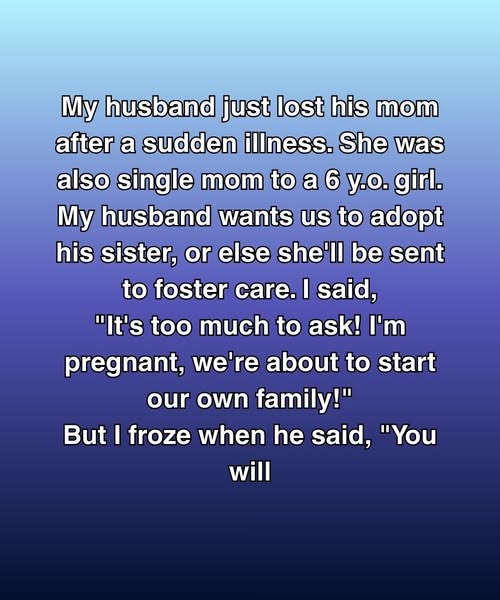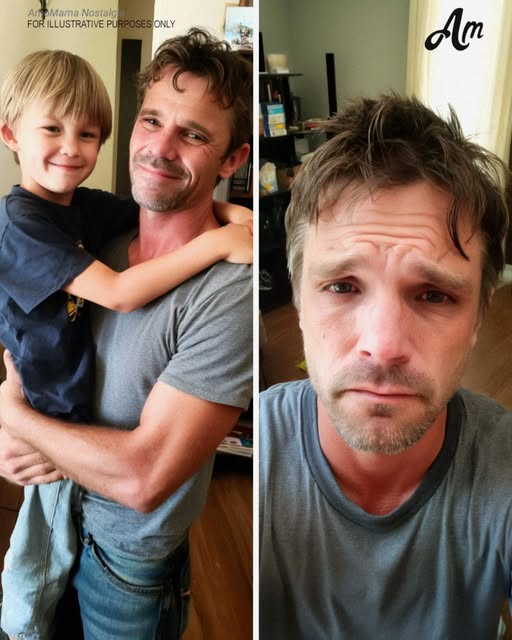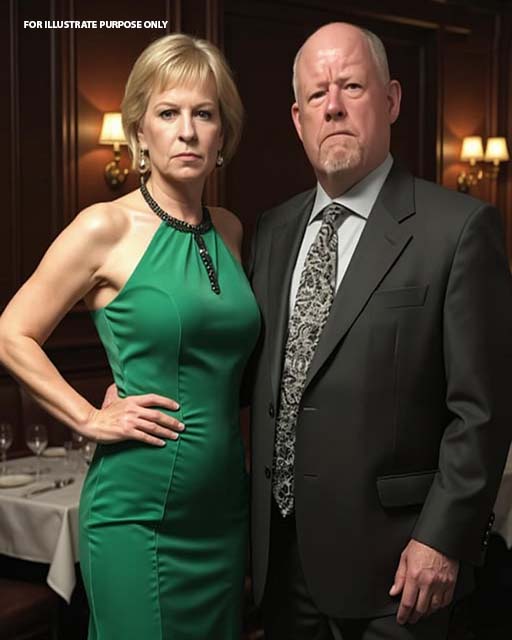When his mother died, the call came in the middle of a Tuesday. By evening my husband was sitting at our kitchen table with his hands braced on either side like the wood might buckle. “If we don’t take Sariyah,” he said, “they’ll send her to foster care.”
I was seven weeks from my due date. The ultrasound photo was crooked on the fridge, tiny socks drying on the radiator. I heard my own voice say, “It’s too much to ask. I’m not ready. We’re about to start our own family.” And then he answered, not angry, not pleading—just certain: “You will.”
The certainty chilled me more than a shout would have. It sounded like a fact already written somewhere I hadn’t agreed to sign.
Sariyah arrived two days later with a caseworker and a suitcase that looked like it belonged to an airline pilot. She was six, with big, watchful eyes and posture that belonged on a much older person. She sat on the edge of the couch, hands folded, spine straight. When my husband said we’d painted her room yellow—“like you liked at your mom’s”—she nodded and said, “Thank you,” as if we were strangers handing her a menu.
I smiled and made spaghetti and then locked myself in the bathroom and cried quietly into a towel. Shame burned behind my ribs. She didn’t cry. I did.
The first weeks were an uneasy choreography. She asked permission for everything. “May I take this book?” “May I put my shoes here?” If I raised my voice to call to my husband in the next room, she flinched. Once I dropped a pan and she jumped like she’d been struck. I braided her hair and made pancakes shaped like stars and bought her a backpack with her favorite cartoon, and she said “thank you” every single time without ever smiling with her whole face.
“Does she talk about it?” I asked my husband at night, whispering like the house might eavesdrop.
“She says she misses Mom,” he said. “Then she stops.”
We gave her space, which felt like doing nothing in a really polite way.
Three weeks early, my water broke on a Sunday morning while Sariyah watched a nature show on the rug. She froze, eyes wide. I grabbed her hand. “It’s okay, sweetie,” I said, breathless. “Baby just wants to meet us now.”
She sat in the hospital waiting room with a coloring book while they wheeled me through double doors. Leina arrived fast and furious, small but perfectly loud. When they placed her on my chest, love crashed into me so hard it shook. I thought that feeling would fix everything.
Back home, people came by with casseroles and cooed over the baby. Sariyah slipped out to the porch steps. At night, I rocked Leina and hummed and saw Sariyah hovering in the hallway, rabbit stuffed under her chin, listening to the monitor like it was a radio. “I didn’t mean to wake her,” she whispered. “I just wanted to hear her breathing.”
That cracked something in me wide open. This wasn’t jealousy. It was fear—of being erased by a new kind of love in a house she still wasn’t sure had room for her.
The next morning I asked if she wanted to help me feed Leina. She held the bottle with both hands like it was made of glass and whispered to the baby about tiny ears and tiny socks. The smile that finally appeared looked like sunlight finding a stubborn window.
After that, she hovered closer—not in the way that crowds you, but in the way that makes you remember to eat lunch. She counted diapers into the bag. She checked for the extra onesie. She sang a song she said her mom used to sing on rainy days. When the colic hit and the nights stretched thin, she offered to read the baby “one page more,” like she was bargaining with a storm.
I started asking little questions. Not about the hospital, not about the end—about the middle. What did you and your mom do on Saturdays? What was your silliest rule? She told me about “backwards day” where they ate dessert first and wore pajamas to the store. Falling asleep on her mom’s lap to TV reruns. I could see the shape of a life in those small things, the soft parts grief never mentions in official forms.
One evening after a long, screaming night, I sat on the kitchen floor and cried into my hands. Sariyah padded in wearing mismatched socks and sat beside me without speaking. Then she slid over a drawing from her backpack. Four stick figures under a yellow sun. She’d labeled us: Dad, Sariyah, Leina, and under mine, careful and crooked: my other mom.
The floor shifted under me. I pulled her in and we cried in the quiet way people cry when a truth finally lands.
It didn’t stay easy. Around Christmas, a cousin on her father’s side appeared in a sharp blazer and sharper perfume, clutching a lawyer’s card. “I’m ready to step up,” she announced, smiling too hard. She didn’t know Sariyah’s birthday. She guessed at her favorite color. She said, “Kids need structure,” like it was a password, then glanced around our crowded living room and sniffed.
We hired an attorney. The cousin had time and money. We had a newborn, a secondhand coffeemaker, and neighbors who wrote letters about Sariyah making chalk hopscotch on the sidewalk and reading to their toddler. One afternoon she found the court notice on the counter and asked, very calmly, “Do I have to go?”
“You’re not going anywhere,” I said, and meant it with everything I had. I couldn’t promise a judge’s decision. I could promise the way we would fight.
In court, my husband went first. Then me. My hands left little half-moons in my palms from how hard I pressed. When they asked if Sariyah would like to speak, my stomach flipped. She stood, small but rooted, and looked straight at the judge.
“I want to stay where I’m safe,” she said. “Where I feel like I’m part of something. I want to stay with my family.”
The words wobbled, but they didn’t fall.
The cousin’s lawyer objected. The judge asked a question or two, flipped through papers, and then said the sentence I still replay sometimes when I’m washing dishes: petition denied.
Six weeks later, the adoption papers arrived in a thick manila envelope. We threw a backyard party with a lopsided banner and cupcakes the color of a rainbow sherbet mistake. Sariyah wore a sunflower dress. Under the string lights she danced with her baby sister until both of them collapsed into lawn chairs giggling and sticky with frosting.
That night, tucking her in, I reached for her lamp and she caught my sleeve. “Can I call you Mom now?” she asked, sleep already tugging her voice. “You’ve always felt like one.”
I nodded so hard the bed creaked.
Now Leina is almost two and a streak of crayons and crumbs; Sariyah started third grade with a backpack full of sharpened pencils and exactly one strawberry sticker on the front because she likes them, even if she can’t eat them. They orbit each other. Leina follows her shadow; Sariyah reads to her and teaches her how to draw hearts and sighs dramatically when the toddler scribbles through the lines and then laughs anyway.
Grief didn’t vanish. It softened and moved over, made room for joy. Some days Sariyah is quiet and sets her rabbit on her pillow like a tiny shrine. Some days we have “backwards day” and eat brownies before broccoli and all wear pajamas to the grocery store, and I catch her looking at me, then at the baby, then at the yellow kitchen light, and smiling with her whole face.
I think about the night I said, “It’s too much to ask,” and the way fear can dress up as practicality and make you feel wise when really you’re just bracing. I was wrong. Love didn’t split when we added another child. It multiplied, loud and ordinary and relentless.
If you’re standing where I stood—staring at your own life like a house that can’t hold one more thing—here’s the quiet truth no one told me: sometimes the thing you think will break you is the thing that makes your family make sense.




